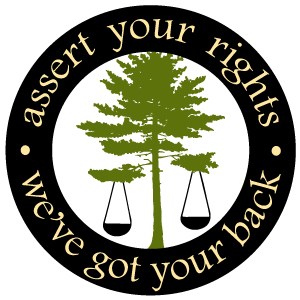Open Government: FOIA and State Public Records Laws
A window into government operations…but be cautious
Open government laws—which include the federal Freedom of Information Act (FOIA) and state public records laws—allow members of the public to make requests for information (subject to exemptions) to government entities, whether that be the FBI, a public university, a police department, or other entity. Making a request for information could lead to receiving thousands of pages of internal emails, investigation reports, photographs, operation and policy manuals, surveillance reports, evidence of collusion between the government and corporations…the list goes on.
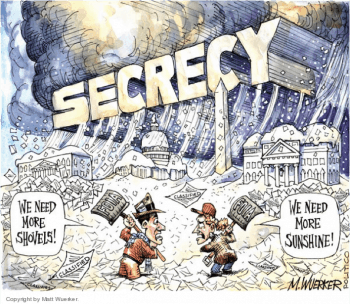 Public records laws provide us with information, access, ways to hold decision-makers accountable, and the opportunity to explore a variety of other ways through which to advance the campaigns and causes to which we are dedicated. But we should find caution in how we use and view open government law. An overarching danger of open government law is in the phrase itself: open. When we are told that something is open, we are not always looking for what may be hidden. If someone makes a public records request and they receive thousands of pages of documents, they may not notice the one “smoking gun” document that is missing. If there were no openness, we would be looking for the secret documents and meetings, but since we are presented with so many, we aren’t looking for the hidden ones. While the solution should not be to put everything in the dark so that people know that they are looking for secrets, activists and other interested parties should be quite aware that just because they are seeing a document does not mean that they shouldn’t look for what else they have not received.
Public records laws provide us with information, access, ways to hold decision-makers accountable, and the opportunity to explore a variety of other ways through which to advance the campaigns and causes to which we are dedicated. But we should find caution in how we use and view open government law. An overarching danger of open government law is in the phrase itself: open. When we are told that something is open, we are not always looking for what may be hidden. If someone makes a public records request and they receive thousands of pages of documents, they may not notice the one “smoking gun” document that is missing. If there were no openness, we would be looking for the secret documents and meetings, but since we are presented with so many, we aren’t looking for the hidden ones. While the solution should not be to put everything in the dark so that people know that they are looking for secrets, activists and other interested parties should be quite aware that just because they are seeing a document does not mean that they shouldn’t look for what else they have not received.
Another danger regarding the use of open government law is that it can be very seductive, and ultimately the victory of getting information is just another tool in a bigger fight, and that’s something that can’t be forgotten. A key phrase that shows up in a variety of political movements is “diversity of tactics.” Generally, diversity of tactics refers to using a variety of different tactics to reach a goal, and using open government laws needs to be just one tactic among many that we put to use.
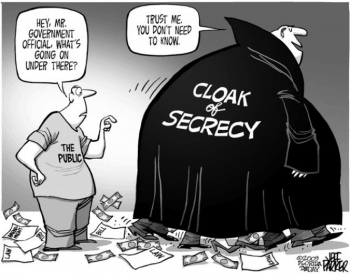 As compliment to this point, we have to remember that there are limits to how we can use open government laws, with the key word being “government.” Among agencies and individuals who are subject to open government laws, many exceptions exist—privacy protections, “state security” exemptions, “ongoing investigation,” etc. A common joke among activists who have made FOIA requests is about how many black sharpies the government must go through when making redactions.
As compliment to this point, we have to remember that there are limits to how we can use open government laws, with the key word being “government.” Among agencies and individuals who are subject to open government laws, many exceptions exist—privacy protections, “state security” exemptions, “ongoing investigation,” etc. A common joke among activists who have made FOIA requests is about how many black sharpies the government must go through when making redactions.
Underlying all discussion about grassroots activists’ and frontline communities’ use of open government law is that we are often fighting against the government. The basic point at which this tension comes into play is at the point of making a public records request. It is ultimately problematic that we have to request records from the very places that we may be in conflict with, or the entity may be interested in keeping them hidden, and those entities may try to fight or delay responding to the request. So we have to push for the information that we need to expose how the government functions to exploit the planet, and at the same time monitors and disrupts the movements trying to save it.
Make YOUR public records requests!
The CLDC encourages activists and organizations to utilize the Freedom of Information Act and the Privacy Act to request documents and materials that the FBI, Homeland Security, FERC or any other government agency may have accumulated about you or a group in which you are active. Not only will this information assist activist and frontline communities in learning about and preventing government spying, but it will also shed light on the extent of surveillance that has been undertaken in your community, including surveillance conducted by corporations and industry if they shared their “reports” with law enforcement (which they often do).
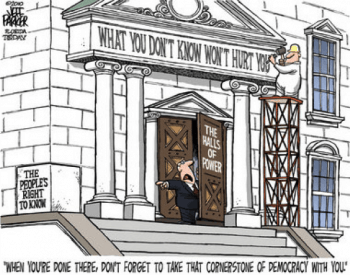 We have provided templates below to assist you in making your FOIA request correctly. One template is used to request your personal file, and the other is to request records about an organization with which you are affiliated. We’ve also provided the privacy waiver needed to receive information about others from the Department of Justice (which includes the FBI); other departments may have their own forms. Also remember: in addition to requesting documents from the FBI, you can also request documents (about yourself, an issue of concern, etc.) from other government agencies under either FOIA or state public records laws.
We have provided templates below to assist you in making your FOIA request correctly. One template is used to request your personal file, and the other is to request records about an organization with which you are affiliated. We’ve also provided the privacy waiver needed to receive information about others from the Department of Justice (which includes the FBI); other departments may have their own forms. Also remember: in addition to requesting documents from the FBI, you can also request documents (about yourself, an issue of concern, etc.) from other government agencies under either FOIA or state public records laws.
Under FOIA, agencies may charge reasonable standard fees. You may request a fee waiver or reduction if “the disclosure of the information is in the public interest because it is likely to contribute significantly to public understanding of the operations or activities of the government and is not primarily in the commercial interests of the requestor.”
If the administrative agency denies your FOIA request, you must “exhaust your administrative remedies,” meaning that you must appeal the decision prior to filing a federal lawsuit. Once the agency has issued a decision on your administrative appeal, then you may consider filing litigation.
In order to file a federal lawsuit alleging violations of FOIA, you must pay a filing fee of $400.00 or request a fee waiver pursuant to the in forma pauperis requirements of the court, 28 U.S.C. § 1915(a). It can take anywhere from 6 months to 6 years or more for FOIA cases to wind their way through the federal court system (normally 1-2 years for a District Court decision), and occasionally the federal agency offers to settle and provide erroneously withheld documents sooner than that. During that time period, you need to be available to your attorney via phone and/or email in order to respond to questions, or to authorize a resolution of your case if one is offered to you. At the conclusion of the case, the Judge will rule on whether you are entitled to the records, and if so, whether the agency is entitled to charge you anything for producing the records or not. If the court decision erroneously fails to provide you with the records, you can appeal to a Federal Court of Appeals.
Get in touch with CLDC if you need help making a public records request, or if an agency has denied your request and you need help with an appeal of federal lawsuit.
Template Documents
Template: Individual FOIA Request (This document should be used for individuals submitting a FOIA request)
Template: Group FOIA Request (This document should be used for groups/organizations submitting a FOIA request)
DOJ Privacy Form (can be used for requests to the FBI)
For additional information about FOIA, visit http://www.foia.gov/
Note that this is a government website, but it provides a lot of useful basic information about FOIA.
You can find contact information for making requests to federal agencies here (as well as FOIA information that is specific to the agencies): http://www.foia.gov/report-makerequest.html
You can usually find information about making other public records requests by doing an internet search for the name of the entity (whether you want the rules for a state, a university, a city, a police department, etc.) and “public records request.” Again, get in touch if you need help figuring out how to make a particular records request.
For Anti-KXL Activists & Organizers
From May 28th, 2015
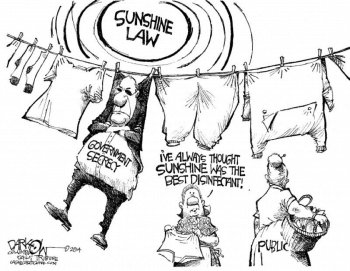 Download the FOIA Privacy waiver here: KXL Blank privacy waiver
Download the FOIA Privacy waiver here: KXL Blank privacy waiver
The CLDC is assisting activists and journalists to acquire FBI documents that we believe will ultimately demonstrate unconstitutional and illegal surveillance of climate justice activists engaged in efforts to stop the Keystone KXL Pipeline. We also believe these FBI records will illustrate the extreme degree of collusion between the federal government and repulsive corporations like Transcanada (the corporation responsible for the KXL tar sands pipeline.
The FBI was forced to turn over some documents regarding their surveillance of activists involved in Texas anti-KXL organizing, but they heavily redacted the documents falsely asserting that they were just protecting the privacy rights of activists by redacting their names!!
So, right now the focus of our work is to acquire FOIA Privacy Waivers from activists and organizers who have worked on anti-KXL campaigns in Texas, and in particular, Houston.
If you are willing to fill it out, please sign it and scan it back to me at info@cldc.org, Subject: KXL FOIA.
In addition, the FBI may have documents that are identified only by an email address. If you are willing, we would love to force them to un-redact email addresses so we can try and further scrutinize the records for information that can be used by the movement in the future. Please provide us with the email address you may have used for KXL organizing purposes we well.
Thank you in advance for your assistance!
In solidarity,
Lauren Regan
Executive Director & Staff Attorney

